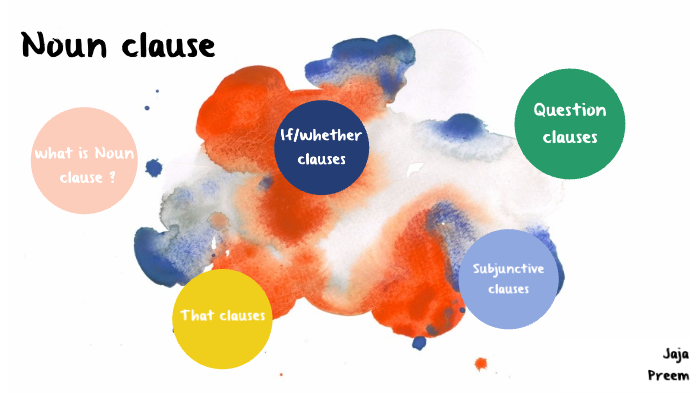What Is Noun Clause / Noun Phrase: Definition, Components and Examples of Noun ... : A noun clause is that contains a finite verb and functioning like a noun within a sentences.. A noun clause is always a dependent clause, meaning it's a part of the sentence that can't stand on its own as an independent thought. The wonderful thing about english teachers is that they all get along so well. Noun clauses can function as subjects, objects, or complements. What you think does not matter. The two forms of noun clauses in the english language are finite noun clauses and nonfinite noun clauses.
Noun clauses replace nouns, and this tutorial shows how. A noun clause is a group of words that contains a subject and a verb; What i had forgotten was that i had a test today. Noun clauses generally begin with words such as how, that, what, whatever, when, where, whether, which, whichever, who, whoever, whom, whomever, and why. I'm elizabeth o'brien, and my goal is to get you jazzed about grammar.

A noun clause functions as a noun, which means it can be a subject, direct object, indirect object, object of a preposition, predicate nominative, or noun clauses usually begin with words called relative pronouns such as how, that, what, whatever, when, where, which, who, whoever, and why.
It can be the subject or object of a verb. Noun clauses begin with words such as how, that, what, whatever, when, where, whether, which, whichever, who, whoever, whom, whomever , and why. Like all clauses, a noun clause has a subject and a verb. A noun clause cannot stand alone because it is not a complete thought. The verb in a clause can be finite use this pan for the pasta. A noun clause is always a dependent clause, meaning it's a part of the sentence that can't stand on its own as an independent thought. Uses and structures of noun clauses along with illustrations. For example, if the sentence asks do you know what time we are leaving? the noun clause is what time we are leaving? you can't easily substitute a noun here. A noun clause is a subordinate clause in a complex sentence that acts as a noun. Noun clauses replace nouns, and this tutorial shows how. What is noun clause, example sentences A noun clause functions as a noun, which means it can be a subject, direct object, indirect object, object of a preposition, predicate nominative, or noun clauses usually begin with words called relative pronouns such as how, that, what, whatever, when, where, which, who, whoever, and why. A noun clause serves the same purpose as a noun.
A noun clause can act as subjects, objects (direct objects and indirect objects), predicate nominatives, complements, or objects. A noun clause is a subordinate clause. = subject complement of 'uncertainty' describing what is uncertain. Noun clauses can function as subjects, objects, or complements. A clause that fulfils the same function as a noun | meaning, pronunciation, translations and examples.

…what you have learned. this clause is a noun clause.
This page has lots of examples of noun clauses and an interactive exercise. A clause is a group of words containing a subject and a verb. What is a noun clause? What you think does not matter. It can be used as the subject, direct object, indirect object, object of a preposition, subject complement, or appositive. A clause that fulfils the same function as a noun | meaning, pronunciation, translations and examples. A noun clause usually begins with the following words: Noun clauses begin with words such as how, that, what, whatever, when, where, whether, which, whichever, who, whoever, whom, whomever , and why. (here the noun clause what she is doing is the object of the preposition in.) noun clauses as compliments. It can be the subject or object of a verb. We offer clauses definition, clauses meaning, and all types of clauses and some clauses examples with clauses exercises. I'm elizabeth o'brien, and my goal is to get you jazzed about grammar. We already have talked about independent and dependent clauses.
What does noun clause mean? It can be the subject or object of a verb. A noun clause is a subordinate clause. Noun clauses are usually introduced by the subordinating conjunctions that, if and whether. So, what is the noun clause?

A noun clause answers the question of what a person is thinking.
For example, if the sentence asks do you know what time we are leaving? the noun clause is what time we are leaving? you can't easily substitute a noun here. As a noun clause does the work of a noun, it can be subject to a sentence, object of a transitive verb, object of a preposition, apposition to a noun, or complement to a linking verb. A noun clause is a dependent clause that contains a subject and a verb. That means it cannot stand alone. It might be a noun clause. So, what is the noun clause? For example (noun clauses shaded) (this noun clause is the direct object of ask.) he knows all about art, but he doesn't know what he likes. We already have talked about independent and dependent clauses. How, that, what, whatever, when, where, whether, which, whichever, who, whoever, whom, whomever, and why. It is a direct object in this sentence. It works as a noun in a sentence. It begins with words such as how, that, what, whatever, when, where, whether, which, whichever, who, whoever, whom, whomever. Like all clauses, a noun clause has a subject and a verb.


0 Komentar